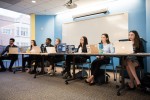Student government candidates will not be disqualified for late paperwork under a Friday judicial board ruling.
Navkaran Gurm, a first-year public affairs and economics student, alleged the Undergraduate Students Association Council Election Board and council itself violated article 13.1.3 of the election code, which states all changes to the election calendar must be proposed by week seven winter quarter. The allegation came Wednesday, after USAC voted to change the election calendar two weeks before voting opens.
The council voted Tuesday to retroactively change the deadline for campaign packets from March 18 to April 1 to accommodate for miscommunications after the election board chair was replaced. Kyana Shajari, USAC election board chair, had announced the change on Facebook mid-March despite never having received official authorization from the council to do so.
Shajari said in an email statement the changes to the election calendar allowed three candidates, who would have been ineligible to run in the spring election, to continue their campaign. Questions about candidate eligibility arose one week after the judicial board initially ruled April 12 that the only official deadline for campaign packets was March 18, as stated in the original election calendar, and that any student who turned in his or her campaign packet after this deadline was ineligible to run.
In Friday’s case, however, the judicial board ultimately ruled in favor of the election board and council, meaning the change to the election calendar remains in effect.
USAC President Claire Fieldman said at the Friday hearing the council changed the calendar to create a formal record of information that was previously disseminated exclusively on Facebook.
Shajari previously said she changed the date and announced the change on Facebook because former election board chair Richard White refused to give her the credentials to the official election board email and social media accounts. Shajari was appointed March 12 to replace White, who was removed from office one week prior to Shajari’s appointment.
Without the accounts, Shajari said she could not collect campaign packets by the official deadline. She added while she never received official permission from the council, she had communicated with council members about the calendar change.
Gurm said he thinks student government election procedures were violated by the Tuesday vote and have also been violated throughout the entire election cycle.
“(USAC) voted to make changes to the election calendar two weeks before elections are about to happen and voting opens,” Gurm said. “I think that’s immoral, unjust and unfair.”
Fieldman said during the hearing the intent of the deadline change was not to make retroactive changes but to codify what council members had already discussed before Shajari announced the change on Facebook.
Gurm said after the hearing he thought the election board should reopen the filing period to allow more students to apply for candidacy. Gurm said he thinks this could help avoid funding a special election in the fall because students could apply to fill the vacant slots on the current election ballot.
There are currently no candidates running for Financial Supports commissioner and for two general representative seats. The vacancies are set to be filled in a fall special election.
“If we can reopen the filing period, there’s plenty of potential candidates that are really interested in running, and if we can have them run right now and get it out in one cycle, I think that’s the logical next step,” Gurm said.
Ryan Ender, the Undergraduate Students Association finance committee chair, said in an email statement a fall special election would cost the election board an additional $6,000, bringing total election costs for the 2019 to 2020 council to $12,000.
Fieldman said although reopening the filing period may potentially help avoid a special election in the fall, doing so would push the current election back by at least one week.
She said reopening the filing period will delay the swearing in of the new council and pose difficulties for the newly appointed council.
“Could reopening the filing period potentially lead to having no special election in the fall?” Fieldman said. “I suppose it could potentially, but is it the most appropriate and the most beneficial course of action to serve the student body and to serve next year’s council? It’s not.”
